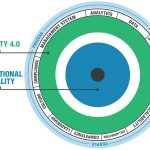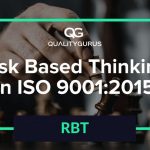Traditional inventory management primarily addresses the uncertainty of demand, but the uncertainty in the supply, mainly due to defective products, is equally crucial. Including defective products introduces variability in supply chains, affecting order quantities and leading to overstock or shortages. This paper formulates a supply chain model incorporating defective products … [Read more...] about Impact of uncertainty ascribed to defective products on supply chains
Quality-Risk Management
Root Cause Analysis 101
This 36-page primer on Root cause analysis (RCA) from audit software supplier EASE covers this essential method in quality management. RCA is used to diagnose the fundamental reason for faults or problems. Five common RCA methods are Pareto Charts, The 5 Whys, Fishbone Diagrams, Scatter Plots, and Failure Mode and Effects Analysis (FMEA). This structured approach helps identify … [Read more...] about Root Cause Analysis 101
Critical failure factors for Quality 4.0: an exploratory qualitative study
Adoption of Quality 4.0 (Q4.0) in organizations is challenging. Identifying the critical failure factors (CFFs) can lead to more effective implementation of Q4.0 initiatives. Researchers used a qualitative research methodology involving in-depth interviews with quality managers and executives to help establish the CFFs associated with Q4.0. This approach enriches the existing … [Read more...] about Critical failure factors for Quality 4.0: an exploratory qualitative study
Why Change Control is Important: Tips for Manufacturers
In the dynamic manufacturing landscape, change control is a crucial mechanism to effectively manage innovations and mitigate associated risks. Recognized for its importance across industries, change control is pivotal in regulated sectors like pharmaceuticals, medical devices, and food and beverage manufacturing. This systematic approach ensures that any alterations in … [Read more...] about Why Change Control is Important: Tips for Manufacturers
A Fool-proof Plan for Building an Effective CAPA Process
(Note: Whitepaper download requires the creation of a free account and log-in) This whitepaper outlines a plan for building an effective Corrective Action, Preventive Action (CAPA) process, a crucial aspect scrutinized by the Food and Drug Administration (FDA). Highlighting the frequent issuance of warning letters due to poor CAPA implementation and documentation, the paper … [Read more...] about A Fool-proof Plan for Building an Effective CAPA Process
Elevate Your Audits: Upgrade Your Conventional Audit Program With A Risk-Based Approach
This "Quality Progress" journal article by Lance B. Coleman Sr. emphasizes integrating risk management into auditing processes. The author argues for a shift from traditional auditing to a risk-based approach, highlighting that this method not only enhances the performance of the audit program but also contributes significantly to the organization. Key to this approach is … [Read more...] about Elevate Your Audits: Upgrade Your Conventional Audit Program With A Risk-Based Approach
Risk-Based Thinking: An Essential Part of ISO 9001
The article delves into the significance of risk-based thinking in the ISO 9001:2015 Quality Management System (QMS) standard. One of the primary concepts introduced in this standard is the systematic approach to considering and addressing risks and opportunities as an essential component of the quality management system. This approach contrasts with the previous version, ISO … [Read more...] about Risk-Based Thinking: An Essential Part of ISO 9001
Risk-Based Thinking and the IATF 16949 Requirements Related to Risk
Risk-based thinking is one of the more significant additions to ISO 9001:2015's list of quality management principles. Risk-based thinking involves incorporating risk analysis in an organizational quality management system, including certain risks' opportunities, probability, and consequences. The goal is to prevent identifiable problems before they happen, evaluating risks … [Read more...] about Risk-Based Thinking and the IATF 16949 Requirements Related to Risk
Closed loop supply chains 4.0: From risks to benefits through advanced technologies. A literature review and research agenda
Industry 4.0, focusing on more interconnective digital technology, has shown promising benefits for manufacturers and supply chains. Specifically, Industry 4.0 technologies could mitigate risks involving closed-loop supply chains, in which organizations rework their waste into new goods or products. This paper outlines two extensive reviews of the current operational risks with … [Read more...] about Closed loop supply chains 4.0: From risks to benefits through advanced technologies. A literature review and research agenda
Quality vs. Inflation and the Deficit
Quality professionals may have more tools to address inflation than previously believed, specifically by removing waste within their organizations. For manufacturers, eliminating waste from supply chains can lower prices, raise wages, and boost profits since waste contributes to inflation. Waste begets poorer quality as organizations spend more on unproductive labor, energy, … [Read more...] about Quality vs. Inflation and the Deficit
Risk Management Rarely Gets to the Root Cause
Large corporations typically have internal risk management functions. Many are staffed by individuals with advanced degrees—even Ph.D.s—in areas such as mathematics, statistics, actuarial science, etc. The role of these folks is to identify areas of financial risk and forestall or reduce the threat they pose to their employer’s profitability. Supply chain risk is evaluated and … [Read more...] about Risk Management Rarely Gets to the Root Cause
A Guide to Quality Risk Management
The main aim of any risk management plan is to make an adverse event less likely to be fatal to your business and reduce the damage done by similar threats when they happen again. All organizations should use risk identification, assessment and management to capitalize on their strengths and evaluate weaknesses. Similarly, quality management is a process that ensures your … [Read more...] about A Guide to Quality Risk Management
ISO 31000:2018 – Risk management
ISO 31000:2018(en)Risk management — Guidelines Organizations of all types and sizes face external and internal factors and influences that make it uncertain whether they will achieve their objectives. Managing risk is iterative and assists organizations in setting strategy, achieving objectives and making informed decisions. Managing risk is part of governance and … [Read more...] about ISO 31000:2018 – Risk management
Definition: High Reliability Organization (HRO)
What is an HRO? Research by a variety of experts, including Karl Weick, Kathleen Sutcliffe, and Karleen Roberts amongst others has driven the evolution of our understanding over 3 decades. Here is a current definition to work from: A High Reliability Organization (HRO) functions with systems and people in place that are exceptionally consistent in accomplishing … [Read more...] about Definition: High Reliability Organization (HRO)
Risk-Based Thinking (RBT) in ISO 9001:2015
Risk-based thinking is an approach to managing quality that focuses on identifying potential problems before they occur. It involves taking a systematic look at how products or services are produced and then considering what could go wrong and what steps can be taken to reduce the likelihood of this happening. By implementing risk-based thinking into your Quality Management … [Read more...] about Risk-Based Thinking (RBT) in ISO 9001:2015
Quality Control and Quality Assurance: What’s the Difference?
Many people get confused about what constitutes quality control (QC) and quality assurance (QA). It’s important to understand the differences and how they both play vital but distinct roles in helping an enterprise achieve the highest quality standards. QA and QC work together as part of an overall quality management system (QMS) and both are essential for achieving and … [Read more...] about Quality Control and Quality Assurance: What’s the Difference?

















